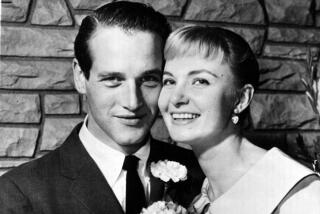When Literary Heat Hits Hollywood
In Hollywood, for every trend there is a season, and this is the season of the big book. Consider the following random examples: Jodie Foster is currently stalking a serial murderer in Thomas Harris’ “Silence of the Lambs,” while the future promises Dustin Hoffman in E. L. Doctorow’s “Billy Bathgate” and Barbra Streisand in Pat Conroy’s “The Prince of Tides.” And last Christmas saw John le Carre’s “The Russia House” accomplished via the irresistible casting of Michelle Pfeiffer and Sean Connery, who, if they chose to, could option and adapt “Beowulf.”
All these films, and a great many more, began life not as screenplays but as literary properties, or, in the local parlance, simply “properties.” And how a “property” becomes a “picture” is a story as confounding as any overly plotted film noir. In fact, it is a genre all its own: part horror story, part romantic comedy, but mostly thriller.
When a book is being auctioned to the movies, it does not happen in an auction house. A book auction, in fact, takes place in no place at all, though it is unquestionably taking place. It’s actually more of an event than a location. But even more than an event, a book auction is a state of mind, or, more accurately, minds--a feeding frenzy of colliding self-interests. It is a simultaneously held perception of one seller and at least two buyers, preferably more. This collective state of mind holds only for a fraction of time, and is of no predictable duration, as it can fizzle early like a bad party if no one shows up.
It starts with a phone call. This is the first of many phone calls in what will be a swaggering, high-stakes game of telephone in true wild-west tradition. This is the game you remember from your earliest birthday parties where the person on your right whispers something in your ear which you must repeat to the person on your left roughly as you heard it. Roughly is the operative word here, as the message gets increasingly distorted, intentionally or otherwise, on its trip around the circle.
The phone call that initiates the ritual is the whisper that launches a thousand rumors. It goes something like this:
Paste in telephone here
Agent: Who told you I had the new Warren Adler manuscript?(1)
Junior Studio Executive: You did.
Agent: I most certainly did not. I deny everything. (2)
Jr.: My notes say the new Adler was due in this week. (3)
Agent: I want to get to the bottom of this. (4)
Jr.: If you get me the manuscript first, I’ll get you a preemptive offer. (5)
Agent: I just turned down a preemptive from Steven. (6)
Jr.: I thought you said no one had the manuscript.
Agent: No one but Steven. (7)
Jr.: How did he get it?
Agent: I’m getting to the bottom of that now.
Jr.: I’ll get the manuscript unofficially out of New York. (8)
Agent: Are you threatening me? Because that’s an automatic disqualifier. (9)
Jr.: Well, what am I supposed to do if it just turns up on my desk? Shred it?
Agent: Make a preemptive offer.
Jr.: I thought you weren’t accepting them.
Agent: I’m not.
Once the bidding has begun, ethical misconduct is largely left to the province of the agent. It runs the usual gamut of double-dealing, inflating offers, committing to multiple buyers--anything to drive up the price, deliver the book to the producer with the highest fee, so he can garner 10% commission on the largest possible package. This is his job.
The most creative malfeasance is committed earlier, however, by the buyers, the better to get into first position. The key is access, the goal is seeing something that hasn’t been seen by anyone else in town. This means the property must be seen while still in galleys, in New York, before it gets into the controlling hands of the Hollywood agent.
Over the years, junior execs have cultivated the art of getting a manuscript “slipped” from New York. Never has such a genteel word described such sleazy goings-on. Here in the gentlemanly world of publishing, far from the booths at the Russian Tea Room, let alone the car phones of Coldwater Canyon, “working girls,” whose ambition would make Melanie herself proud, are busily photocopying into the night. Rewards for then brown-bagging the bootlegged manuscript and secreting it off to the coast involve cash (rumors of up to thousands per) and jobs. It’s the latter that matters. Eventually, those working girls come west, with their Xeroxing relationships intact. With allies like these, they can build careers.
There is a moment in the auction--a precipitous instant when all the buyers are still interested and monumental numbers dance around the seller’s head like fat sugarplums--that is what passes for a true existential moment in our business. It is the fictive moment, the Walpurgis second, when anything can happen--the suspension of disbelief. You can sense it: Stories are invented at breakfast and related at lunch. Heat is palpable and inflationary. The skeptics and the believers are joined at the hip. Junior execs are selling the book so hard to their bosses that they have become indistinguishable from the agent. These conversations go like this:
Jr.: Only we and Steven have the book.
Sr.: Katzenberg has it.
Jr.: Only Steven, Katzenberg and us.
Sr.: Fox has it.
Jr.: Fox got it slipped from New York, unofficially.
Sr.: Why didn’t we get it out of New York?
Jr.: You closed our New York office.
Sr.: How much will it cost?
Jr.: Seven figures, or high sixes. No option.
Sr.: Purchase outright?
Jr.: You got it.
Sr.: Tell the agent we’re in and get me Fox’s coverage. (10)
It should be noted that at no point in this conversation did either the employee or the employer inquire as to the content of the book in question. This is an exaggeration, though not much of one. More accurately, the Jr. will tell the Sr. the so-called hook of the piece; this one-minute pitch is what all those lonely years of an author’s life is reduced to. And how well that minute is conceived is entirely out of his control: It depends on which Jr. exec happened to have been the first to note the book on this tracking sheets.
The Jr.’s literacy value is determined by his ability to capture the gene of a book in the simplest possible sentence. (This has been justified over the years by the ultimate need to market the movie in a single sentence, but everyone knows that is really attributable to movie execs’ notoriously short attention spans.) This improvised slug line becomes a sufficient basis for the investment of hundreds of thousands of dollars, because everyone gets caught up in the tempo of the thing: He wants it so I want it and they all want it so it must be good. She wants it and she’s smart and she’s offering a lot of money, so I’ll be even smarter and offer more.
Until recently, the success rate of adapting big books into “go” pictures has been notoriously low. Perhaps, you might argue, this is traceable to the fact that so few manuscripts actually have been read by their buyers. But that’s only one of the reasons. Another reason is failure of conviction: Once no one else is bartering for the material, it’s harder to tell that it’s good. Worse, if the original Jr. has switched studios by the time the first draft has arrived, then the project is doubly suspect--the orphaned wallflower at the development meeting.
Often, books are optioned by producers as a means to an end, the end being a meeting with a movie star and/or a relationship with an A-list director. In this common tactic, a big book is merely a magnet with New York literary prestige as its charge. A producer shops for his elements until a bankable star says “yes.” In that instant, the literary becomes the glitterati, transforming the author into a virtual star and the star into a virtual author. The modern alliance of the movie star and the author would have made Marilyn Monroe and Arthur Miller proud. Who knows? If the option price had been high enough it might have saved their marriage.
1--The definition of a Very Hot Book is one whose author’s last book was turned into a Danny DeVito, Kathleen Turner, Michael Douglas movie that earned $100 million dollars.
2--The best offense is a good defense, or something like that.
3--Notes refer to the exec’s tracking sheets, which keep him and his colleagues up to the minute on books due out over the next decade.
4--See 2, reverse.
5--An offer offered early in the hopes no one else will be offered the chance to make an offer.
6--A lie. Believe nothing this agent says for the rest of the conversation.
7--See 5.
8--Have it stolen by his sister-in-law, a well-remunerated receptionist at Book of the Month Club.
9--Something that radically displeases the agent, unless accompanied by a huge sum of money.
10--This book could sell for a million dollars off the notes written by an anonymous recent Princeton graduate working late in the basement of Fox.
More to Read
Sign up for our Book Club newsletter
Get the latest news, events and more from the Los Angeles Times Book Club, and help us get L.A. reading and talking.
You may occasionally receive promotional content from the Los Angeles Times.






